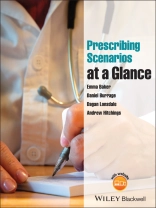Prescribing Scenarios at a Glance is an innovative resource which allows medical students and junior doctors to practise prescribing skills safely for themselves. Supporting those who wish to develop their prescribing knowledge and clinical reasoning, this book features 50 acute and on call scenarios in a hospital setting. Users will be able to practise skills such as initiating a prescription, planning management, reviewing therapy, and identifying adverse drug reactions and interactions.
Prescribing Scenarios at a Glance:
* Contains case scenarios, mock drug charts and model answers with discussion
* Features a workbook of prepared drug charts for each case that allow users to practise prescription writing
* Includes detailed explanations and answers to all case scenarios, including examples of correctly completed charts
* Includes access to refill drug charts for each scenario available on the companion website at www.ataglanceseries.com/prescribingscenarios, allowing users to rehearse each scenario as many times as they like
An ideal companion for medical students, foundation doctors and non-medical prescribers as they develop their prescribing skills, this book will help to instil confidence, reduce errors, and encourage best practice. It will also be a valuable resource for candidates preparing for prescribing exams.
This title is also available as a mobile App from Med Hand Mobile Libraries. Buy it now from i Tunes, Google Play or the Med Hand Store.
Jadual kandungan
Acknowledgements 7
Dedication 7
List of abbreviations 8
How to use your textbook 10
About the companion website 13
Introduction: Practical prescribing scenarios 14
Please note that the prepared drug charts can be found in theaccompanying workbook.
Case Page
Section 1: The acute take Case Drug chart Answer
1 An 82-year-old woman who requires venous thromboembolismprophylaxis 30 1.1 38
2 A 104-year-old woman with respiratory failure 30 2.1 40
3 A 64-year-old man with severe acute abdominal pain 31 3.141
4 A 55-year-old woman with atrial fi brillation 31 4.1 43
5 A 32-year-old man with community-acquired pneumonia 32 5.145
6 A 45-year-old woman with status epilepticus 32 6.1 47
7 A 27-year-old woman with suspected bacterial meningitis 33 7.148
8 A 31-year-old woman with paracetamol overdose 34 8.1 50
9 A 59-year-old man with acute pulmonary oedema 35 9.1 52
10 A 24-year-old woman with acute asthma 35 10.1 54
11 A 57-year-old man who has suddenly deteriorated 36 11.157
12 An 84-year-old man taking warfarin who has a headache 36 12.159
13 A 66-year-old man with acute coronary syndrome 37 13.1 61
14 A 67-year-old man with an exacerbation of COPD 37 14.1 64
Section 2: On call in the hospital Case Drug chart Answer
15 A 91-year-old man with hypoglycaemia 68 15.1 82
16 A 60-year-old woman requesting night sedation 68 16.1 83
17 A 62-year-old man with suspected opioid toxicity 69 17.184
18 A 58-year-old man who has low blood pressure 69 18.1 86
19 A 44-year-old woman who is ‘nil by mouth’ 70 19.188
20 A 59-year-old man with circulatory compromise 70 20.1 90
21 A 15-month-old girl with gastroenteritis 71 21.1 93
22 A 5-year-old boy with a painful right arm 71 22.1 94
23 A 12-hour-old boy with signs of sepsis 72 23.1 96
24 A 60-year-old man who has developed a hot joint 72 24.197
25 A 65-year-old man with hypokalaemia 73 25.1 99
26 A 69-year-old woman being treated with gentamicin 73 26.1102
27 A 69-year-old man anticoagulated with warfarin 74 27.1104
28 A 28-year-old woman with nausea 74 28.1 105
29 A 29-year-old man who is in pain following an operation 7529.1 107
30 A 49-year-old man due to undergo surgery 75 30.1 110
31 A 79-year-old woman with acute kidney injury 76 31.1 112
32 An 85-year-old woman with hospital-acquired pneumonia 77 32.1114
33 A 47-year-old man who has developed an abnormal liver profile78 33.1 116
34 An 83-year-old man who develops diarrhoea 79 34.1 118
35 An 88-year-old man with hyperkalaemia 80 35.1 121
36 A 69-year-old woman with acute alcohol withdrawal 81 36.1123
Section 3: Routine inpatient review Case Drug chart Answer
37 A 69-year-old woman with constipation 128 37.1 135
38 A 71-year-old man who has developed a tremor 128 38.1 136
39 An 81-year-old woman at risk of fragility fractures 129 39.1138
40 A 23-year-old pregnant woman with pulmonary embolism 129 40.1140
41 A 31-year-old man with increased seizure frequency 130 41.1141
42 A 58-year-old man with diabetes mellitus treated with insulin130 42.1 143
43 A 53-year-old man who wants to stop smoking 131 43.1 146
44 A 90-year-old woman on numerous medications 131 44.1 148
45 A 54-year-old woman with a peptic ulcer 132 45.1 150
46 A 64-year-old woman with chronic kidney disease 132 46.1152
47 A 66-year-old man with palpitations 133 47.1 154
48 A 70-year-old man with ST-elevation acute coronary syndrome133 48.1 156
49 A 49-year-old woman with chronic liver disease complaining ofpain 134 49.1 158
50 An 89-year-old man approaching the end of life 134 50.1160
Appendix 1 Antibiotic guidelines 163
Appendix 2 Case summaries 164
Index 166
Mengenai Pengarang
Emma Baker is Professor of Clinical Pharmacology, St.
George’s, University of London, and Consultant Physician, St.
George’s Healthcare NHS Trust, London
Daniel Burrage is Academic Clinical Fellow, St.
George’s, University of London, and Specialty Registrar (ST3) in
Clinical Pharmacology, General Medicine and Stroke Medicine, St.
George’s Healthcare NHS Trust, London
Dagan Lonsdale is Academic Clinical Fellow, St. George’s,
University of London, and Specialty Registrar (ST3) in Clinical
Pharmacology, General Medicine and Intensive Care Medicine, St.
George’s Healthcare NHS Trust, London
Andrew Hitchings is Clinical Research Fellow, St. George’s,
University of London, and Specialty Registrar (ST7) in Clinical
Pharmacology, General Medicine and Intensive Care Medicine, St.
George’s Healthcare NHS Trust, London












